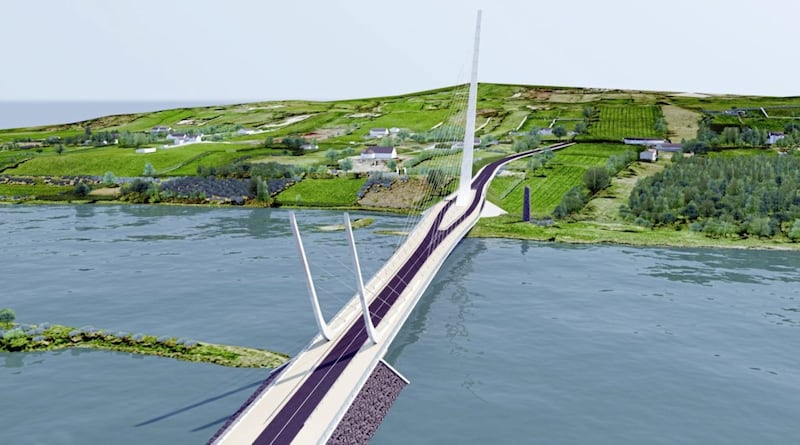There are a number of provisos around the Irish government’s financial commitments but the magnitude of the sums involved make this a hugely historic intervention that will likely have ramifications for decades to come.
The pledge of €600m (£514.5m) to help the planned A5 upgrade surpassed all expectations, as well as figures quoted by senior Dublin government sources in preceding reports. Add to this the €50m (£42.9m) commitment to Casement Park, along with the assortment of other projects for which money has been earmarked, and you have a substantial pot of cash.
To put it in perspective, it’s roughly the equivalent of the annual budget for Stormont’s Executive Office and Department for Infrastructure combined.
Dublin has of course made cash commitments before.
- As it happened: Dublin government announces €800 million for funding projects benefiting Northern IrelandOpens in new window
- It’s all about procurement now for Casement - and Heron may be backOpens in new window
- Irish government to fund hourly train service from Dublin to Belfast - but journey to remain just as longOpens in new window
- A5 upgrade: ‘Start work now’ is the message from business, campaigners and politiciansOpens in new window
- Narrow Water Bridge: Campaigners behind long-awaited cross-border project say ‘dream is still alive’Opens in new window
In 2007, following the restoration of power-sharing on foot of the St Andrews Agreement, £400m was pledged to the A5, only for the figure to be significantly scaled down in the aftermath of the financial crisis.
Subsequent commitments to the northern section of the Derry-Dublin road were more piecemeal but ultimately academic due to delays in getting the project started.

Now there’s a strong expectation that ground will broken along the A5 route by year end, meaning there’s every likelihood that draw down of this money will start soon, and as Tánaiste Micheál Martin pointed out, contracts for the Narrow Water Bridge could be signed as early as next month.
The education and female entrepreneurship funding will flow as soon as practicable, while the new hourly Belfast-Dublin train service should also be in place within months.
The Irish government has put its money where its mouth is; everybody knew the Republic’s exchequer had a huge surplus last year but few imagined it would agree to part with such a substantial amount.
While unionism celebrated last month’s Safeguarding the Union command paper and heralded its commitment to scrap a legal duty to protect an all-island economy, nationalism is welcoming cross-border funding that dwarfs previous pledges.
It also came with a clear acknowledgement from Taoiseach Leo Varadkar that this was about “realising the potential of all-Ireland benefits” and “boosting the all-island economy”.
It’s money that is likely to make a real material difference for all traditions in both jurisdictions, as the A5 and Narrow Water Bridge, as well as Ulster GAA’s headquarters, will all serve citizens of the Republic in some capacity.
Naturally, there will be those who will play down the significance of this announcement, and like Sir Jeffrey Donaldson, suggest that it is not Dublin’s place to subsidise part of the UK. Yet we shouldn’t assume that this massive cash pledge will somehow gall the British government, who by their actions in recent months, clearly resent giving the north what they feel is more than the region’s fair share.
It’s understood the British government was kept in the loop regarding the Shared Island announcement and it could even be speculated that in the longer term, as the north-south dynamic transforms along the route to a united Ireland, such contributions will become commonplace.
The inter-state action over legacy notwithstanding, it’s apparent that Irish-British relations have improved vastly since Rishi Sunak entered Downing Street.
They often stand on each others’s toes rather than stick to the choreography but on the whole there’s greater positive engagement between London and Dublin, arguably the best there’s been since 2016.
It must also be acknowledged that while the current Irish government’s commitment is sincere, this administration is in its latter stages and could be gone within six months.
It would be wrong to assume their successors will pull the plug on the funding but it can’t be taken for granted.
The best policy is to get it spent as soon as possible.




